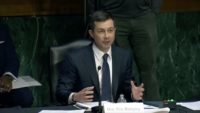Infrastructure
Sen. Capito to Challenge FHWA Highway Funding Priorities Memo

The top Republican on the Senate Environment and Public Works Committee, Shelley Moore Capito (W.Va.), says she plans to issue a formal challenge to a December 2021 Federal Highway Administration guidance document concerning the types of projects states should pursue using the billions of federal highway formula dollars provided by the Infrastructure Investment and Jobs Act.
Capito's plan was bolstered by the Government Accountability Office's Dec. 15 determination that the FHWA guidance is a federal regulation and thus is subject to the Congressional Review Act.
That statute sets forth a process for members of Congress to invalidate federal rules that they find objectionable.
Capito said in a statement that GAO in its report “confirmed what we have been pointing out for the past year: in its December 2021 memo, the Federal Highway Administration went beyond simply restating existing legal requirements for states, it expressed a policy preference and took steps to implement that preference.”
FHWA Reaction to GAO Decision
But FHWA has a different view. An agency spokesperson said in an emailed statement, "GAO's decision confirms FHWA and U.S. DOT's established position throughout the last year: the memorandum is an internal, non-binding, FHWA policy document directed to FHWA staff, with no impact on states' unquestioned statutory right to pursue projects of their choosing."
The spokesperson pointed to the GAO decision's statement that "We acknowledge that states could potentially ignore the preferences that FHWA articulated in the memo and still receive funding from the agency to implement the projects they prioritize and select, provided that applicable federal requirements have been met."
Capito has been perhaps the FHWA guidance document's strongest congressional critic, raising the issue at committee hearings earlier this year with U.S. DOT Secretary Pete Buttigieg and the since-confirmed nominee for FHWA Administrator, Shailen Bhatt.
In February, Capito, Senate Minority Leader Mitch McConnell (R-Ky.), and 27 other Senate Republicans wrote to President Joe Biden, asking him to direct FHWA to "rescind or substantially revise" the memo. Biden's administration has done neither.
The FHWA memo says that its intent is to ensure that IIJA funds, to the extent that statutes allow, "encourage" states "to invest in projects that upgrade the condition of streets, highways and bridges and make them safe for all users, while at the same time modernizing them so that the transportation network is accessible for all users, provides people with better choices across all modes, accommodates new and emerging technologies, is more sustainable and resilient to a changing climate and is more equitable."
In the memo, FHWA also says it will work with funding recipients 'to encourage and prioritize the repair, rehabilitation, reconstruction, replacement and maintenance of existing transportation infrastructure..."
But Capito has argued that the guidance imposes a "one-size-fits-all solution to address the surface transportation needs of all communities."
Buttigieg has defended the memo, as has Environment and Public Works Chair Sen. Tom Carper (D-Del.).
Under the Congressional Review Act, Congress has 60 legislative days from when a rule is sent to Congress and a Senate-House resolution of disapproval is introduced. If both houses clear the disapproval regulation, it goes to the president for his signature or veto.
The 60 legislative days time frame would push a final resolution of the challenge well into 2023.
And with Democrats' holding the Senate majority in the 118th Congress and Biden in the White House, a challenge to the FHWA guidance would face an uphill road. But critics are concerned about the memo's impact on projects that add highway capacity.
Data on Capacity-Adding Projects
FHWA says that since the IIJA was signed on Nov. 15, 2021, 763 capacity-expanding projects have been funded, using $7.1 billion in federal funds.
Of those capacity projects, the agency says, 13 have made it through the National Environmental Policy Act process, since the FHWA memo was issued.
FHWA adds that states also "are choosing, on their own volition, to pursue road repair and reconstruction work."
The agency also cites a recent American Road & Transportation Builders Association report on year one of the IIJA, which found that 43% of the IIJA-funded projects were for repairs or reconstruction, and 20% for capacity additions.





